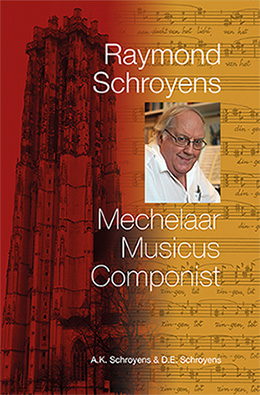A brief overview
| 1954 | Graduate, Lemmensinstitute Mechelen |
| 1958 | Graduate Roy. Flem. Cons. of Mus. Antwerpen, major: organ (Flor Peeters) |
| 1958-60 | Director of Church Music, Dearborn/Detroit, Mich. USA |
| 1962-72 | Harpsichordist with Concertino J.B.Loeillet, Mechelen |
| 1963-93 | Chief music producer at the BRT-Brussel, Radio 3 (classical music) and Head of department Programming and Studio recording, Radio 3. |
| 1970-93 | Professor of harpsichord, Royal Conservatory of Music, Brussel and City Music Academy, Mechelen |
| 1983-2000 | Member Board of Trustees and Musical Advisor, Festival of Flanders, Mechelen |
| 1994-99 | Chairman Ars Organi, Mechelen |
| 1996-97 | Chairman Flemish Federation for Young Choirs, Ghent |
|
|
|
| 1967 | Bulgarian State First Prize winner for piano accompaniment, Sofia |
| 1970 | Prizewinner of the International Composers Competition for Carillon music, Mechelen |
| 1983 | Prizewinner of the Fuga Trophy, Sabam & Union of Belgian Composers, Brussel |
Raymond Schroyens Biography

To buy a copy please email info@raymondschroyens.com
Raymond Schroyens
b. Mechelen (Belgium), 14.03.1933, d. Gent (Belgium), 13.07.2021
He obtained a Master of Music at Mechelen's Lemmens Institute (1954) and at the Royal Flemish Conservatorium of Music in Antwerp (Koninklijk Vlaams Conservatorium, Antwerpen), taking a Master's Degree in organ with the renowned Flor Peeters (1958); this led to a church music directorship in Michigan, USA, an appointment he fulfilled for two years. From 1963 till 1993 Schroyens built up a music career at the Belgian National Radio in Brussels (Belgische Radio en Televisie). In 1971, a teaching position in harpsichord at the Brussels Royal Conservatorium of Music (Koninklijk Muziekconservatorium Brussel) was added to his curriculum; this he maintained until his official retirement in 1993. Likewise, he taught harpsichord at the Music Academy of his native town between 1975 and 1988.
Performer
R. Schroyens appeared as solo harpsichordist in a number of concerts both nationally and internationally (e.g. with the Karl Münchinger Chamber Orchestra, in duo with Robert Veyron-Lacroix) and as a frequent recitalist in chamber ensembles. He took part in recording sessions for various radio stations, including several productions for BBC Radio. Nonetheless he kept close to his first love: piano accompaniment in Lied performance. In 1967, he was awarded an official prize in this field at an International Contest sponsored by the Bulgarian State.
Composer
Vocal music caught his attention at the age of nine (1942) when he became a boy soprano in the Mechelen Cathedral Choir – one of its 270 choristers. He started to compose at an early age, his first serious work dating from 1953. The list of vocal compositions grew steadily, outnumbering his instrumental output.
R.S. composed individual solo songs as well as song cycles, such as De la lumière aux ténèbres and Before Sundown. Among his instrumental works are: Thinking of July the 4th (organ) – Piano Sonata – Acacia floreat (ww. trio) – Templum (brass 5tet) – Aureoles (brass ens.) – Gaia (pno duet) – Al di la del Sonno (str. orch.) – Eleusis (sax & pno) – Beetles, Butterflies and Birds (mand. + guit.) – Halt im Gedächtnis (hpsch'd solo). His Battery for Bells (1970) was awarded 'Prize of the City of Mechelen' in its International Competition for Carillon Composition.
Prominent among his choral works are the following: Adagio Triptych (Flemish texts) – Three Canticles (religious) – Songs of Silence (Flemish texts) – Missa Spes et Dubitatio (+ organ) – Trois Verlaines – Veni dilecte mi (Song of Songs).
Raymond Schroyens enjoyed numerous commissions from both instrumentalists and choral ensembles; he was regularly tasked with composing set competition pieces for the International Choir Festivals of Neerpelt and of Maasmechelen. In addition he was repeatedly invited as a jury member for various international choral contests.
In function of his practice as a harpsichordist and continuo player, he realized some 40 written-out basso continuo accompaniments to baroque songs and arias, and 25 partimenti (concert-style accomp.) of multi-movement baroque trio sonatas. In his discipline, he also edited two full-size cantatas, one by Joseph Hector Fiocco (1703-1741) and one by Carolus Hacquart (1640-1701?), both Flemish baroque composers.
Other Creative Work
Besides giving lectures and contributing articles on sundry musical topics (some published in professional magazines), the composer also wrote a considerable body of incidental poetry (unpublished).